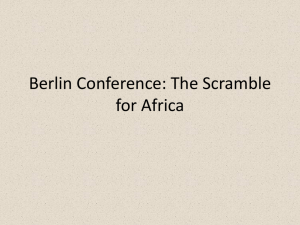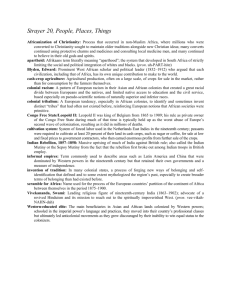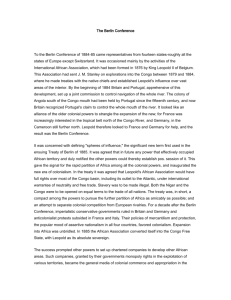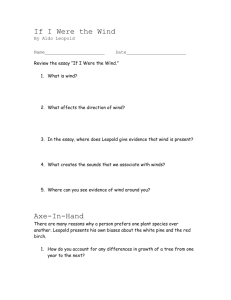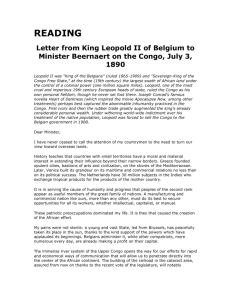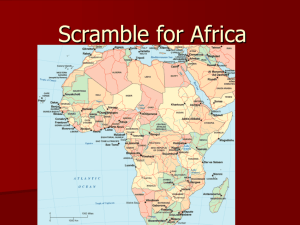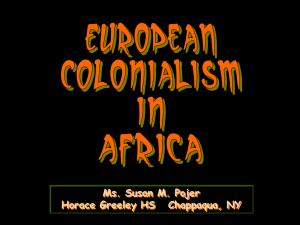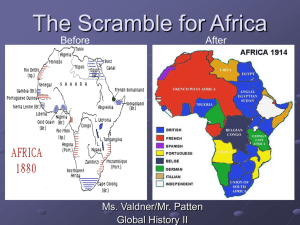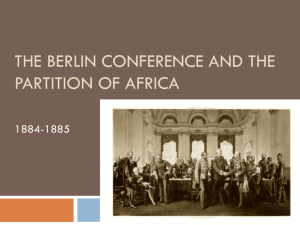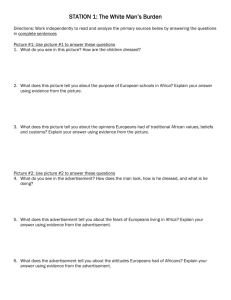The Scramble for Africa
advertisement
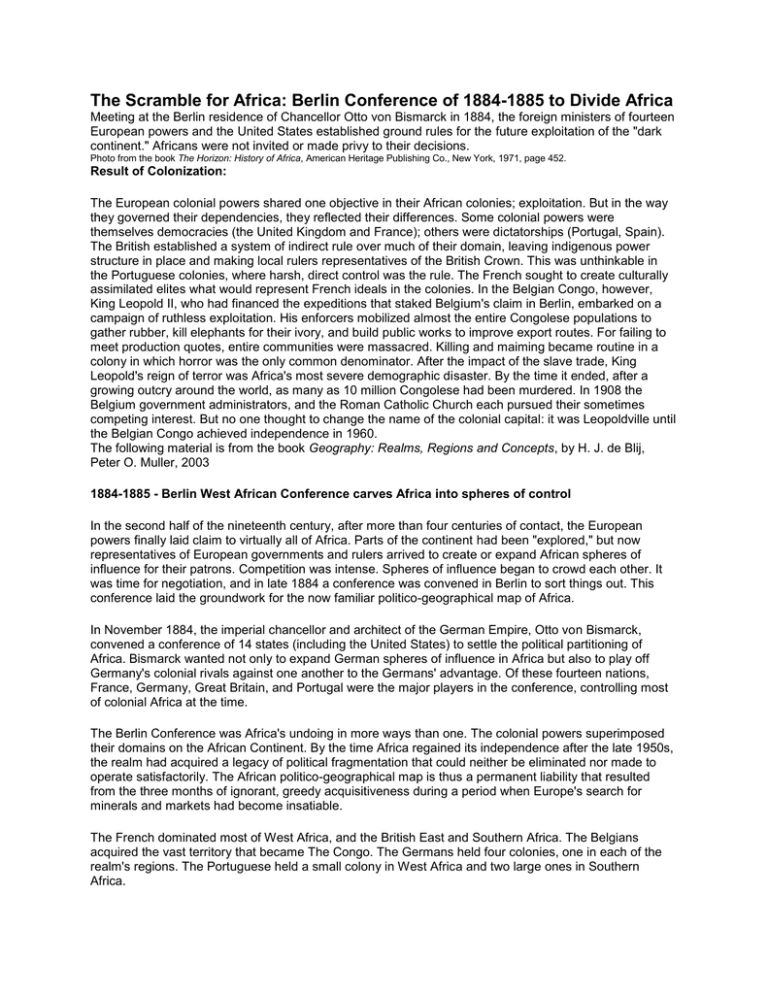
The Scramble for Africa: Berlin Conference of 1884-1885 to Divide Africa Meeting at the Berlin residence of Chancellor Otto von Bismarck in 1884, the foreign ministers of fourteen European powers and the United States established ground rules for the future exploitation of the "dark continent." Africans were not invited or made privy to their decisions. Photo from the book The Horizon: History of Africa, American Heritage Publishing Co., New York, 1971, page 452. Result of Colonization: The European colonial powers shared one objective in their African colonies; exploitation. But in the way they governed their dependencies, they reflected their differences. Some colonial powers were themselves democracies (the United Kingdom and France); others were dictatorships (Portugal, Spain). The British established a system of indirect rule over much of their domain, leaving indigenous power structure in place and making local rulers representatives of the British Crown. This was unthinkable in the Portuguese colonies, where harsh, direct control was the rule. The French sought to create culturally assimilated elites what would represent French ideals in the colonies. In the Belgian Congo, however, King Leopold II, who had financed the expeditions that staked Belgium's claim in Berlin, embarked on a campaign of ruthless exploitation. His enforcers mobilized almost the entire Congolese populations to gather rubber, kill elephants for their ivory, and build public works to improve export routes. For failing to meet production quotes, entire communities were massacred. Killing and maiming became routine in a colony in which horror was the only common denominator. After the impact of the slave trade, King Leopold's reign of terror was Africa's most severe demographic disaster. By the time it ended, after a growing outcry around the world, as many as 10 million Congolese had been murdered. In 1908 the Belgium government administrators, and the Roman Catholic Church each pursued their sometimes competing interest. But no one thought to change the name of the colonial capital: it was Leopoldville until the Belgian Congo achieved independence in 1960. The following material is from the book Geography: Realms, Regions and Concepts, by H. J. de Blij, Peter O. Muller, 2003 1884-1885 - Berlin West African Conference carves Africa into spheres of control In the second half of the nineteenth century, after more than four centuries of contact, the European powers finally laid claim to virtually all of Africa. Parts of the continent had been "explored," but now representatives of European governments and rulers arrived to create or expand African spheres of influence for their patrons. Competition was intense. Spheres of influence began to crowd each other. It was time for negotiation, and in late 1884 a conference was convened in Berlin to sort things out. This conference laid the groundwork for the now familiar politico-geographical map of Africa. In November 1884, the imperial chancellor and architect of the German Empire, Otto von Bismarck, convened a conference of 14 states (including the United States) to settle the political partitioning of Africa. Bismarck wanted not only to expand German spheres of influence in Africa but also to play off Germany's colonial rivals against one another to the Germans' advantage. Of these fourteen nations, France, Germany, Great Britain, and Portugal were the major players in the conference, controlling most of colonial Africa at the time. The Berlin Conference was Africa's undoing in more ways than one. The colonial powers superimposed their domains on the African Continent. By the time Africa regained its independence after the late 1950s, the realm had acquired a legacy of political fragmentation that could neither be eliminated nor made to operate satisfactorily. The African politico-geographical map is thus a permanent liability that resulted from the three months of ignorant, greedy acquisitiveness during a period when Europe's search for minerals and markets had become insatiable. The French dominated most of West Africa, and the British East and Southern Africa. The Belgians acquired the vast territory that became The Congo. The Germans held four colonies, one in each of the realm's regions. The Portuguese held a small colony in West Africa and two large ones in Southern Africa. After colonial rule was firmly established in Africa, the only change in possessions came after World War I. Germany's four colonies were placed under the League of Nations, which established a mandate system for other colonizers to administer the territories. The Congo Free State, conceived as a "neutral" zone to be run by an international association in the interest of bringing science, civilization, and Christianity to the indigenes, received the Berlin Conference's blessings. Belgium's King Leopold II (far left) soon took control, reaping fabulous personal profits through the sale of land and development rights. Scandalously little was reinvested in schools like the one shown here. A man who exploited Congo's resources and contributed to up to 10 million deaths. One man told the BBC: "He left us in poverty. He exploited our raw materials and left us with nothing." Leopold's Legacy of Violence Map courtesy of Civilization Past & Present - Illustrations Berlin Conference Document King Makoko and Queen French explorer named Savorgnan de Brazza. Nominally employed by the French government, he undertook an expedition up the Ogoue River in the 1870’s. Along his journey, de Brazza concluded a series of treaties with an African chief known as Makoko. These treaties ceded large tracts of land to de Brazza, as a representative of France; yet they were vague and highly irregular, and the government decided to ignore them. However, in 1882, as a result of the Egypt crisis, the government of France reversed itself and publicly recognized the Makoko treaties as valid, thereby claiming a considerable amount of territory in Central Africa. It wasn’t so much that the French government wanted to get back at Britain, but rather the French public, resenting the losses their country suffered to Germany and angered by the weak role France had played in Egypt, was particularly susceptible to the press campaign that de Brazza, members of the government and other interested parties waged in support of the treaties (Chamberlain 53). Update: King Makoko of the Teke says he and his ancestors have not benefited enough from a contract they signed in 1880 with the French explorer, Pierre Savorgnan de Brazza, and which ceded the Teke kingdom to France. (Full article at BBC News) MORE ABOUT KING LEOPOLD King Leopold's legacy of DR Congo violence Mark Dummett Former BBC Kinshasa correspondent Of the Europeans who scrambled for control of Africa at the end of the 19th century, Belgium's King Leopold II left arguably the largest and most horrid legacy of all. While the Great Powers competed for territory elsewhere, the king of one of Europe's smallest countries carved his own private colony out of 100km2 of Central African rainforest. He claimed he was doing it to protect the "natives" from Arab slavers, and to open the heart of Africa to Christian missionaries, and Western capitalists. Instead, as the makers of BBC Four documentary White King, King Leopold II left arguably the largest Red Rubber, Black Death and most horrid legacy powerfully argue, the king unleashed new horrors on the African continent. Torment and rape He turned his "Congo Free State" into a massive labour camp, made a fortune for himself from the harvest of its wild rubber, and contributed in a large way to the death of perhaps 10 million innocent people. What is now called the Democratic Republic of Congo has clearly never recovered. I was so moved, Your Excellency, by the people's stories that I took the liberty of promising them that in future you will only kill them for crimes they commit "Legalized robbery enforced by violence", as Leopold's reign was described at the time, has John Harris Missionary in Baringa remained, more or less, the template by which Congo's rulers have governed ever since. Meanwhile Congo's soldiers have never moved away from the role allocated to them by Leopold - as a force to coerce, torment and rape an unarmed civilian population. Chopping hands As the BBC's reporter in DR Congo, I covered stories that were loud echoes of what was happening 100 years earlier. The film opens with the shocking images of some of Leopold's victims - children and adults whose right hands had been hacked off by his agents. They needed these to prove to their superiors that they had not been "wasting" their bullets on animals. This rule was seldom observed as soldiers kept shooting monkeys and then later chopping off human hands to provide their alibis. Men who failed to bring enough rubber for agents were killed 'Foreign correspondents' Director Peter Bate uses documented accounts of such atrocities to present an imaginary court case against the monarch who he compares to a subsequent European tyrant, Adolf Hitler. He has an actor play the bearded, heavily-set Leopold, fidgeting nervously as damning testimonies are read out, compiled by the foreign correspondents of the day, the missionaries. John Harris of Baringa, for example, was so shocked by what he had come across that he felt moved to write a letter to Leopold's chief agent in the Congo. "I have just returned from a journey inland to the village of Insongo Mboyo. The abject misery and utter abandon is positively indescribable. I was so moved, Your Excellency, by the people's stories that I took the liberty of promising them that in future you will only kill them for crimes they commit." Positive legacy In the film's most powerful sequences we see reconstructions of the terror caused by Leopold's enforcers and agents. We see a village burnt without warning and its people rounded up; its men sent off into the forests, and its women tied up as hostages and helpless targets of abuse until their husbands return with enough wild rubber to satisfy the agent. This, we are told, was the "moment of truth" for the whole community. If the men did not bring back enough and the agent lost his commission, he would order the deaths of everyone. There is no doubt that Congo's history, and White King, Red Rubber, Black Death are almost too upsetting to bear, however Leopold did leave, albeit unwittingly, one positive legacy the birth of modern humanitarianism. The campaign to reveal the truth behind Leopold's "secret society of murderers," led by diplomat Roger Casement, and a former shipping clerk ED Morel, became the first mass human rights movement. Its successors like Amnesty Children and adults had their hands International, Human Rights chopped off Watch and the Kinshasa-based Voix des Sans Voix and Journaliste En Danger mean abuses in modern day DR Congo can never be hidden for long. If you would like to watch this film, I will be screening it on Tuesday February 2nd.
